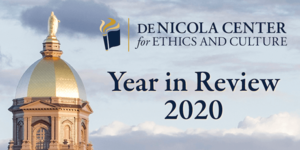
Dear Friends of the de Nicola Center,
What a difference a year makes. When last I wrote a year-end reflection, back in 2019, no one could have imagined how different our world would look today as a result of the COVID-19 pandemic. As I reflect on this unprecedented year, however, I am proud to report that the work of the de Nicola Center for Ethics and Culture has continued stronger than ever, and that our efforts to share the richness of the Catholic moral and intellectual tradition, both at Notre Dame and in the public square, achieved great success—thanks to the generous support of our friends and benefactors.
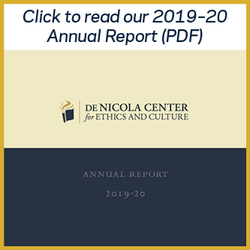
In spite of its challenges, 2020 was a year of growth for the de Nicola Center: Following a transformative endowment from the de Nicola family in the spring of 2019, the Center undertook a comprehensive strategic planning process to evaluate our goals and plot a course for our growth and development over the next five years. The result is a road map that will guide our work at the de Nicola Center, expanding the reach and success of our mission for the future. We look forward to building on our already strong foundation, and we have begun to see great fruit as the strategic plan is implemented and the Center’s vision for the future unfolds.
Last January, we took a contingent of more than eight hundred students, faculty, and staff to the March for Life in Washington, D.C., as we do every year, to serve as a joyful witness to the dignity of all human life from conception to natural death. Following the March, more than five hundred alumni and friends joined us for a reception, co-hosted with our friends in the ND Alumni Association, to celebrate the university’s institutional commitment to advancing a culture of life in the public square.
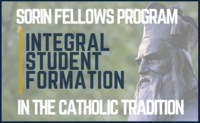
Sadly, the pandemic changed our plans for the remainder of the semester when the university was forced to close in March. While we had to postpone a Spring Break pilgrimage to the Holy Land with forty of our Sorin Fellows, we do hope to make the journey again in the future, to visit and pray at the sites hallowed by Jesus and His first disciples. Above all, we were so proud of the way our more than three hundred Sorin Fellows took these changed plans in stride and successfully finished their semester at home. We said farewell to 103 students who finished their studies in May, including 32 undergraduates and 7 law students who graduated with highest honors (including our Polking Fellow, Hope Steffensen, who graduated summa cum laude and is now clerking on the U.S. Court of Appeals).
And while the pandemic changed plans for many, our Sorin Fellows were awarded prestigious summer internships and research projects with organizations like the Becket Fund for Religious Liberty, the Holy See Permanent Observer Mission to the UN, and the Sisters of Life in New York City. Throughout the uncertainty, our Sorin Fellows continued to flourish in their formation and develop as future leaders in the Church and the world. All of this is only possible with the support of generous friends like you.
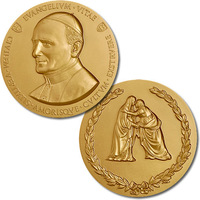
The pandemic also forced the postponement of our annual celebration of the Notre Dame Evangelium Vitae medal this past April. We had announced in October 2019 that this prestigious award for heroes of the pro-life movement would be given to Vicki Thorn, founder of of the worldwide post-abortion healing ministry Project Rachel. No one is more deserving, as Project Rachel has brought healing and hope to thousands of women, men, and families around the world. We sorely missed being able to gather with hundreds of friends in the pro-life movement for the beautiful Mass and dinner that celebrate our honorees every year, but we plan to honor Vicki and the work of Project Rachel at an event in April 2021. We do hope you will mark your calendar to join us for this joyful occasion, whether in person or virtually, as details are communicated in the new year.
I often boast about the extraordinary staff of the de Nicola Center, and that pride was borne out in how quickly and seamlessly our team responded to the changes brought on by the pandemic. This summer, the de Nicola Center reconfigured its activities and transitioned to virtual programming to continue bringing our world-class events and speakers to an even broader audience.
In June, we adapted our annual Vita Institute into a webinar series that condensed our usual week-long intensive intellectual training program for leaders in the pro-life movement into five key lectures from our world-renowned faculty. This “virtual Vita Institute” has already been viewed by thousands of thought leaders and pro-life citizens around the world. This enhanced impact has been extraordinary, and thanks to your support, we are forming an even broader array of future leaders who will bring about a world in which every child, born and unborn, along with their mothers and fathers, are cared for and protected by the law.
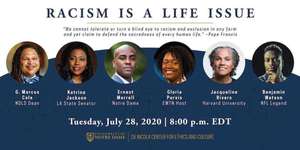
At the end of July, we convened and hosted an online panel titled “Racism Is a Life Issue,” a conversation on the many points of connection and shared principles between the struggle to protect every human life, born and unborn, and the fight for racial justice. The panel featured a distinguished group of speakers: G. Marcus Cole (dean of Notre Dame Law School), Gloria Purvis (EWTN Catholic Radio), Sen. Katrina Jackson (D, LA State Senate), Benjamin Watson (NFL Super Bowl champion), Jacqueline Rivers (Harvard University), and Ernest Morrell (professor of English and Faculty Fellow of the dCEC). Panelists engaged in a fascinating conversation inspired by the words of Pope Francis earlier this summer: “We cannot tolerate or turn a blind eye to racism and exclusion in any form and yet claim to defend the sacredness of every human life.” We were pleased to have the College of Arts and Letters, the Notre Dame Law School, and the Mendoza College of Business co-sponsor this important conversation, which continues to receive thousands of views.
Our Sorin Fellows program adapted quickly to the changes in on-campus learning this fall by addressing students’ specific needs through a variety of new initiatives. Hundreds of Notre Dame, Saint Mary’s, and Holy Cross students had the opportunity to engage in regular faculty seminars and intimate conversations with Catholic professionals, which have given our Sorin Fellows exclusive opportunities to learn from and interact with our expert faculty and Catholic leaders across disciplines and vocations. We also produced a series of sixteen weekly video Gospel reflections by our priest friends on campus, particularly within Holy Cross or those conducting graduate studies, as an exclusive offering to help spiritually nourish our students during a particularly challenging semester. Through these varied offerings, our Sorin Fellows learned to actualize the rich Catholic moral and intellectual tradition in which the de Nicola Center has helped to form them.
We were also delighted to welcome our 2020 Polking and Solomon Fellows this fall. Veronica Webb, a first-year student at Notre Dame Law School, was awarded the prestigious Polking Fellowship for her demonstrated commitment to advancing a culture of life through her work and studies in the law. Evelyn Behling, a graduate student in political science, was awarded the Solomon Fellowship in recognition of her thoughtful appreciation of the Catholic intellectual tradition and its application to her studies. Both students received top-up funding to support their studies while at Notre Dame and will benefit from participating in the dCEC’s student programming, while receiving mentorship and guidance from the dCEC’s extensive network of scholars and Faculty Fellows.
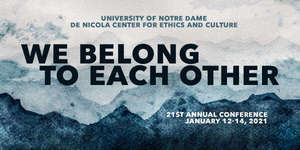
Of course, health and safety guidelines did not allow us to convene our annual Fall Conference this November, which regularly brings together 1,000 guests for three days of conversation and reflection around pressing issues related to ethics, culture, and public policy today. We particularly missed the wonderful community of scholars and friends who gather every year to pursue truth in charity with our amazing lineup of speakers and guests; instead, we are making plans to host a virtual event in the spirit of the Fall Conference on the theme “We Belong to Each Other,” scheduled for January 12–14, 2021. Through the wonders of technology, this virtual event will reach many more friends than we could ever hope to welcome in person to campus. Registration details will be communicated later this month, but please mark your calendar for January 12–14 to join us for this virtual event.

A further triumph of the last year was the release of nine new titles spread among our four award-winning book series with the University of Notre Dame Press: Aleksandr Solzhenitsyn’s March 1917: The Red Wheel, Node III, Vol. 2 and Between Two Millstones: Book 2, as well as the edited volume Solzhenitsyn and American Culture (Center for Ethics and Culture Solzhenitsyn Series); Theology after Colonization (Notre Dame Studies in African Theology); Maureen Condic’s Untangling Twinning, Jason T. Eberl’s The Nature of Human Persons, and Christopher Kaczor’s Disputes in Bioethics (Notre Dame Studies in Medical Ethics and Bioethics); and two newly translated volumes by Pierre Manent: Natural Law and Human Rights and Montaigne: Life Without Law (Catholic Ideas for a Secular World). Notably, The Red Wheel, Node III, Vol. 2 was recognized as a Choice 2020 Outstanding Academic Title, the third year in a row that a volume in our Solzhenitsyn Series has been recognized with this prestigious award.
We are proud to be the home of so many authors and works that engage enduring themes of human dignity, freedom, and the common good. And we are proud, under the auspices of the de Nicola Center, to project these transformative voices into elite academia and the public square. We are grateful for the continued support and friendship of the amazing UND Press Director, Steve Wrinn.
This academic year, as a result of the efforts undertaken in our mission stewardship program, we also welcomed four outstanding new professors to the Notre Dame family: Christina Bambrick (assistant professor of political science), Brian Mulholland (assistant professor of the practice in mathematics), Kathryn Mulholland (assistant professor of the practice in mathematics), and Rev. John Paul Kimes (associate professor of the practice at Notre Dame Law School). Our mission stewardship program aims to support Notre Dame’s efforts to recruit, hire, and retain faculty who are passionate about the university’s distinctive Catholic identity, and these four exceptional scholars will bring their passion for Notre Dame’s unique mission to their work educating the hearts and minds of the students in their classrooms for years to come.
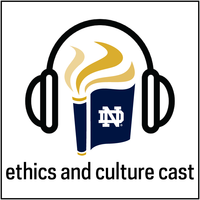
In addition to our virtual programming this year, the de Nicola Center continued to reach our friends off campus through new releases in our podcast series. “Ethics and Culture Cast,” which features engaging conversations with dozens of scholars and friends of the Center, hit a new milestone when we released our fiftieth episode this fall. The podcast has tallied more than 71,000 downloads to date, and we are looking forward to releasing fascinating new conversations in 2021. And though we couldn’t host any of our legendary tailgates this fall, we mailed specially designed “home-gating” kits to our friends so that they could root for the Fighting Irish at home, in true dCEC style, as they continue their historic run for the 2021 National Championship.
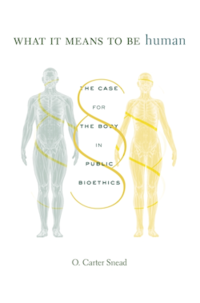
Finally, in my own capacity, I am pleased to note the publication of my book, What It Means to be Human: The Case for the Body in Public Bioethics (Harvard University Press 2020). I am grateful for the warm reception it has received, including endorsements from Alasdair MacIntyre, Mary Ann Glendon, Frank Fukuyama, Farr Curlin, Leon Kass, and George Weigel. I was especially humbled by Yuval Levin’s generous review in the Wall Street Journal, where he wrote:
By sketching out an ethic of mutual obligation rooted in our common vulnerabilities, the book opens a path to a more humane society. More than an important contribution to bioethics, What It Means to be Human is among the most important works of moral philosophy produced this century.
This book grew out of, reflects, and is continuous with the work of the de Nicola Center, and it would not have been possible but for the great gift of being able to serve as its director.
Looking back on all that we have accomplished this year, I am deeply proud of the ways in which the de Nicola Center has continued to advance its work in support of the university’s distinctive Catholic mission, and to project Notre Dame’s countercultural voice in the global public square. We are humbled and grateful for the generosity of our friends and benefactors who have continued to make this vital work possible.
From all of us here at the de Nicola Center, thank you, and best wishes for a blessed Advent season!
In Notre Dame,
O. Carter Snead
Director, de Nicola Center for Ethics and Culture
P.S. – In this season of giving, we hope you will consider making a contribution to the de Nicola Center for Ethics and Culture. Thank you for your support!
Originally published by at ethicscenter.nd.edu on December 09, 2020.